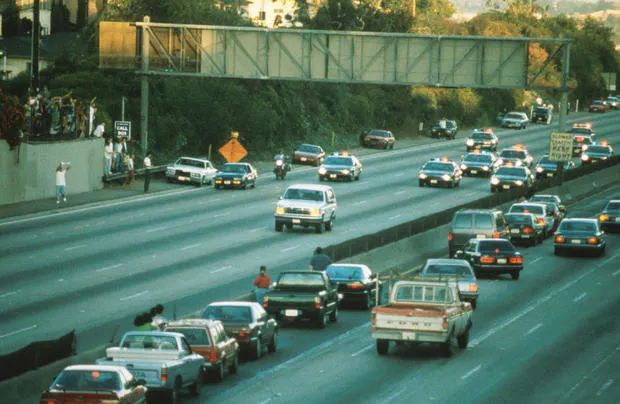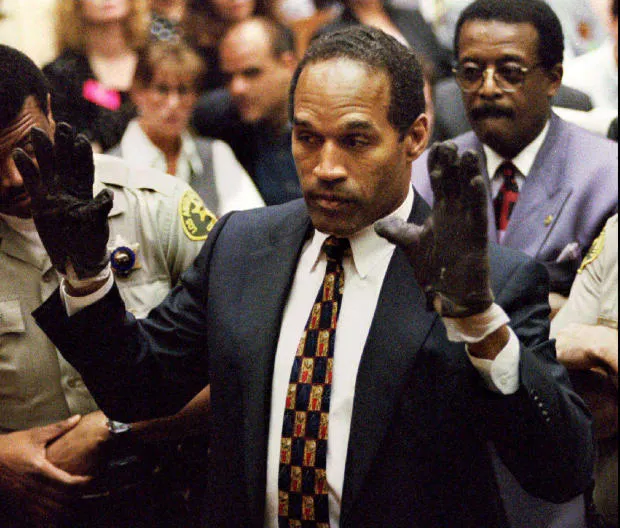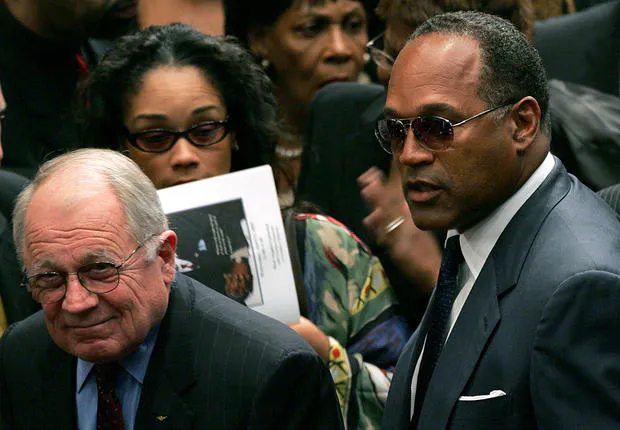O.J. Simpson, Acquitted Murder Defendant And Football Star, Dies At Age 76
O.J. Simpson, the acquitted California murder defendant, former football star and actor, has died, his agent confirmed to CBS News. He was 76.Thursday, April 11th 2024, 2:45 pm
O.J. Simpson, the acquitted California murder defendant, former football star and actor, has died, his agent confirmed to CBS News. He was 76.
A statement posted to social media by Simpson's family said he died of cancer Wednesday. Simpson's agent said he had prostate cancer.
"On April 10th, our father, Orenthal James Simpson, succumbed to his battle with cancer. He was surrounded by his children and grandchildren," the family's statement said.
Simpson was famously acquitted in the 1994 slayings of his ex-wife, Nicole Brown Simpson, and her friend Ronald Goldman, in a case that dominated headlines and TV screens for months. He was later found liable for their deaths by a jury in a civil trial.
David Cook, an attorney who has been seeking since 2008 to collect the civil judgment in the Goldman case, said he spoke with Fred Goldman, father of Ron, on Thursday about Simpson's death. Cook declined to say what Fred Goldman said or where he was.
"He died without penance," Cook said of Simpson. "We don't know what he has, where it is or who is in control. We will pick up where we are and keep going with it."
"He had a very complicated legacy," attorney Carl E. Douglas, who was on Simpson's legal team during the murder trial, told CBS News. He said Simpson's legacy included his accomplishments on the football field and successful move from athletics to becoming a highly sought-after pitchman.
"Before Michael Jackson, before Tiger Woods, there was O.J. Simpson running through airports and highways hawking cereal, cars and rental car agencies," Douglas said.
Simpson earned fame, fortune and adulation through football and show business, but his legacy was forever changed by the June 1994 knife slayings in Los Angeles.
Evidence found at the scene seemed overwhelmingly against Simpson. Blood drops, bloody footprints and a glove were there. Another glove, smeared with blood, was found at his home.
The knife used in the slayings has never been found. In 2016, Los Angeles police said a retired officer turned in a knife that was allegedly found years earlier by a construction worker during the demolition of Simpson's estate. Police concluded the knife wasn't the murder weapon.
On the night of the murders, Simpson flew overnight to Chicago to play in a golf tournament and checked into a hotel near O'Hare airport. While at the hotel, he claimed that he had cut his hand on a broken glass.
When he was back in LA, authorities said he reneged on a promise to surrender, and live TV coverage of his arrest after a famous slow-speed chase marked a stunning fall from grace for the sports hero.
 Image Provided By: CBS NEWS
Image Provided By: CBS NEWS
He had seemed to transcend racial barriers as the star Trojans tailback for college football's powerful University of Southern California in the late 1960s, as a rental car ad pitchman rushing through airports in the late 1970s, and as the husband of a blonde and blue-eyed high school homecoming queen in the 1980s.
"I'm not Black, I'm O.J.," he liked to tell friends.
The public was mesmerized by his "trial of the century" on live TV. His case sparked debates on race, gender, domestic abuse, celebrity justice and police misconduct.
The trial's prosecutors, defense attorneys and witnesses became household names. Watercooler conversations nationwide focused on prosecutors Marcia Clark and Christopher Darden, Judge Lance Ito, Simpson's houseguest Kato Kaelin, homicide detective Mark Fuhrman and Simpson's "dream team" of defense attorneys, including legendary lawyer Johnnie Cochran.
Simpson didn't testify, but the prosecution asked him to try on the gloves in court. He struggled to squeeze them onto his hands and spoke his only three words from the trial: "They're too small."
Cochran told the jurors, "If it doesn't fit, you must acquit."
 Image Provided By: CBS News
Image Provided By: CBS News
The jury found him not guilty of murder in 1995, but a separate civil trial jury found him liable in 1997 for the deaths and ordered him to pay $33.5 million to family members of Brown and Goldman.
A decade later, still shadowed by the California wrongful death judgment, Simpson led five men he barely knew into a confrontation with two sports memorabilia dealers in a cramped Las Vegas hotel room. Two men with Simpson had guns. A jury convicted Simpson of armed robbery and other felonies.
Imprisoned at age 61, he served nine years in a remote northern Nevada prison, including a stint as a gym janitor. He was not contrite when he was released on parole in October 2017.
The parole board heard him insist yet again that he was only trying to retrieve sports memorabilia and family heirlooms stolen from him after his criminal trial in Los Angeles.
"I've basically spent a conflict-free life, you know," claimed Simpson, whose parole ended in late 2021.
Public fascination with Simpson never faded. Many debated if he had been punished in Las Vegas for his acquittal in Los Angeles. In 2016, he was the subject of both an FX miniseries and five-part ESPN documentary.
"I don't think most of America believes I did it," Simpson told The New York Times in 1995, a week after a jury determined he did not kill Brown and Goldman. "I've gotten thousands of letters and telegrams from people supporting me."
 Image Provided By: CBS News
Image Provided By: CBS News
Twelve years later, following an outpouring of public outrage, Rupert Murdoch canceled a planned book by the News Corp-owned HarperCollins in which Simpson offered his hypothetical account of the killings. It was to be titled, "If I Did It."
Goldman's family, still doggedly pursuing the multimillion-dollar wrongful death judgment, won control of the manuscript. They retitled the book "If I Did It: Confessions of the Killer."
"It's all blood money, and unfortunately I had to join the jackals," Simpson told The Associated Press at the time. He collected $880,000 in advance money for the book, paid through a third party.
"It helped me get out of debt and secure my homestead," he said.
Less than two months after losing the rights to the book, Simpson was arrested in Las Vegas.
Simpson played 11 NFL seasons, nine of them with the Buffalo Bills, where he became known as "The Juice" on an offensive line known as "The Electric Company." He won four NFL rushing titles, rushed for 11,236 yards in his career, scored 76 touchdowns and played in five Pro Bowls. His best season was 1973, when he ran for 2,003 yards — the first running back to break the 2,000-yard rushing mark.
"I was part of the history of the game," he said years later, recalling that season. "If I did nothing else in my life, I'd made my mark."
Of course, Simpson went on to other fame.
One of the artifacts of his murder trial, the carefully tailored tan suit he wore when he was acquitted, was later donated and placed on display at the Newseum in Washington, D.C. Simpson had been told the suit would be in the hotel room in Las Vegas, but it turned out it wasn't there.
Orenthal James Simpson was born July 9, 1947, in San Francisco, where he grew up in government-subsidized housing projects.
After graduating from high school, he enrolled at City College of San Francisco for a year and a half before transferring to the University of Southern California for the spring 1967 semester.
He married his first wife, Marguerite Whitley, on June 24, 1967, moving her to Los Angeles the next day so he could begin preparing for his first season with USC — which, in large part because of Simpson, won that year's national championship.
Simpson won the Heisman Trophy in 1968. He accepted the statue the same day that his first child, Arnelle, was born.
He had two sons, Jason and Aaren, with his first wife; one of those boys, Aaren, drowned as a toddler in a swimming pool accident in 1979, the same year he and Whitley divorced.
Simpson and Brown were married in 1985. They had two children, Justin and Sydney, and divorced in 1992. Two years later, Nicole Brown Simpson was found murdered.
"We don't need to go back and relive the worst day of our lives," he told the AP 25 years after the double slayings. "The subject of the moment is the subject I will never revisit again. My family and I have moved on to what we call the 'no negative zone.' We focus on the positives."
More Like This
January 2nd, 2025
January 2nd, 2025
January 2nd, 2025
Top Headlines
January 2nd, 2025
January 2nd, 2025
January 2nd, 2025











